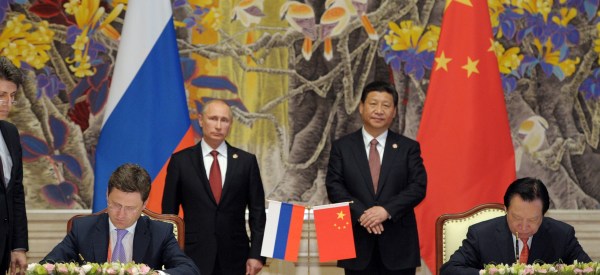
ALEXEY DRUZHININ via Getty Images
By Nathan Gardels, Editor-in-chief It looks more and more like the downing of Malaysian Flight 17 over the Ukraine could be the "Ferdinand moment" that, though it may not be lead in 2014 to a 1914-type world war, is clearly accelerating the splitting up of the post-Cold War world into blocs. (The analogy is to the assassination of Archduke Ferdinand in Sarajevo by a Serbian nationalist that set in motion the chain of events that led to World War I.)
Artyom Lukin writes from Vladivostock that the stiffer sanctions imposed on Russia are pushing it further into a formal alliance with China against the West.
Ivan Sukhov writes from Moscow that the sanctions may well end up achieving the dream of hard-line nationalists whose very aim is to "close Russia's window to the West." On this centennial anniversary of the outbreak of World War I,
seven Harvard scholars list the lessons of 1914 for today.
From the Middle East,
Anav Silverman writes from Kibbutz Ein Hashlosha about how determined farmers are coping with the constant threat of Hamas rockets and cross-border infiltrations through tunnels. Writing from Gaza,
Mohammed Suliman let's out a passionate cry for dignity in the "open air prison" in which he lives. Writing from Cairo,
Wael Nawara doubts that Hamas' strategy serves the interests of Palestinians.
Lord David Owen lays out the terms for what he believes would be a settlement to end the war.
Former Israeli's foreign minister and prominent "liberal Zionist"
Shlomo Ben-Ami argues that Israel's greatest threat is not a nuclear Iran, but the growing campaign to undermine Israeli's legitimacy. The first president of the Islamic Republic of Iran,
Abolhassan Bani-Sadr, writes from exile outside Paris that "Khameini and Netanyahu" are "two sides of the same coin" for seeking absolute victory over enemies through violence.
James Stravidis, former Supreme Commander of NATO, says it is time to cooperate with Iran to achieve US interests in the Middle East.
In other matters,
Maria de los Angeles Torres recalls "Operation Pedro Pan" that once allowed migrant minors to enter the United States. BrasilPost's
Octavio Dias writes from Sao Paulo that, for all its woes, the poor are moving up in Brazil. As Argentina is forced to default once again on its debts,
Pierpaolo Barbieri writes from Buenos Aires about the bankrupt ideology of Cristina Kirchner's government.
Finally,
Nicolas Berggruen analyzes the surprising fact that Germany has the most unequal distribution of wealth in the eurozone.
WHO WE ARE
EDITORS: Nathan Gardels, Senior Advisor to the Berggruen Institute on Governance and the long-time editor of NPQ and the Global Viewpoint Network of the Los Angeles Times Syndicate/Tribune Media, is the Editor-in-Chief of The WorldPost. Farah Mohamed is the Managing Editor of The WorldPost. Kathleen Miles is the Senior Editor of the WorldPost. Alex Gardels is the Associate Editor of The WorldPost. Nicholas Sabloff is the Executive International Editor at the Huffington Post, overseeing The WorldPost and HuffPost's 10 international editions. Eline Gordts is HuffPost's World Editor.
CORRESPONDENTS: Sophia Jones in Istanbul; Matt Sheehan in Beijing.
EDITORIAL BOARD: Nicolas Berggruen, Nathan Gardels, Arianna Huffington, Eric Schmidt (Google Inc.), Pierre Omidyar (First Look Media) Juan Luis Cebrian (El Pais/PRISA), Walter Isaacson (Aspen Institute/TIME-CNN), John Elkann (Corriere della Sera, La Stampa), Wadah Khanfar (Al Jazeera), Dileep Padgaonkar (Times of India) and Yoichi Funabashi (Asahi Shimbun). Sergio Munoz Bata is Contributing Editor-At-Large.
CONTRIBUTING EDITORS: Moises Naim (former editor of Foreign Policy) and Nayan Chanda (Yale/Global; Far Eastern Economic Review). Katherine Keating (One-On-One) and Jehangir Pocha (NewsX India) .
The Asia Society and its ChinaFile, edited by Orville Schell, is our primary partner on Asia coverage. Eric X. Li and the Chunqiu Institute/Fudan University in Shanghai and Guancha.cn also provide first person voices from China. We also draw on the content of China Digital Times. Seung-yoon Lee is The WorldPost link in South Korea.
Jared Cohen of Google Ideas provides regular commentary from young thinkers, leaders and activists around the globe. Bruce Mau provides regular columns from MassiveChangeNetwork.com on the "whole mind" way of thinking. Patrick Soon-Shiong is Contributing Editor for Health and Medicine.
ADVISORY COUNCIL: Members of the Berggruen Institute's 21st Century Council and Council for the Future of Europe serve as the Advisory Council -- as well as regular contributors -- to the site. These include, Jacques Attali, Shaukat Aziz, Gordon Brown, Fernando Henrique Cardoso, Juan Luis Cebrian, Jack Dorsey, Mohamed El-Erian, Francis Fukuyama, Felipe Gonzalez, John Gray, Reid Hoffman, Fred Hu, Mo Ibrahim, Alexei Kudrin, Pascal Lamy, Kishore Mahbubani, Alain Minc, Dambisa Moyo, Laura Tyson, Elon Musk, Pierre Omidyar, Raghuram Rajan, Nouriel Roubini, Nicolas Sarkozy, Eric Schmidt, Gerhard Schroeder, Peter Schwartz, Amartya Sen, Jeff Skoll, Michael Spence, Joe Stiglitz, Larry Summers, Wu Jianmin, George Yeo, Fareed Zakaria, Ernesto Zedillo, Ahmed Zewail, and Zheng Bijian.
From the Europe group, these include: Marek Belka, Tony Blair, Jacques Delors, Niall Ferguson, Anthony Giddens, Otmar Issing, Mario Monti, Robert Mundell, Peter Sutherland and Guy Verhofstadt.
MISSION STATEMENT The WorldPost is a global media bridge that seeks to connect the world and connect the dots. Gathering together top editors and first person contributors from all corners of the planet, we aspire to be the one publication where the whole world meets.
We not only deliver breaking news from the best sources with original reportage on the ground and user-generated content; we bring the best minds and most authoritative as well as fresh and new voices together to make sense of events from a global perspective looking around, not a national perspective looking out. 
